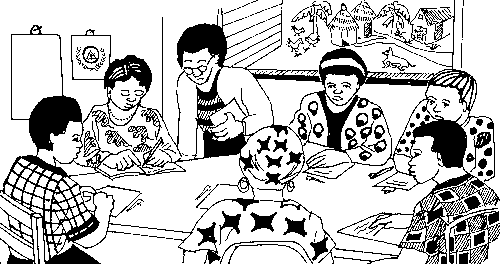Tweet
Translations:
'العربية / al-ʿarabīyah
বাংলা / Baṅla
Català
中文 / Zhōngwén
English
Deutsch
Español
Filipino/Tagalog
Français
Galego
Ελληνικά / Elliniká
हिन्दी / hindī
Italiano
بهاس ملايو / Bahasa Melayu
Polszczyzna
Português
Română
తెలుగు /Telugu
Tiếng Việt
Türkçe
Other formats:
Other Pages:
Modules
Site Map
Key Words
Contact
Utility Documents
Useful Links
FACILITATING PARTICIPATION IN APPRAISAL
Stimulating Community Self Assessment
by Phil Bartle, PhD
Facilitators' Notes
What do you, the community mobilizer or facilitator, do to stimulate and encourage community participation in the assessment and appraisal of community resources and needs?
The Importance of Community Participation:
The participation of all community members in the systematic observation, recording and assessment of their own communities is a central element in the process of empowering communities. Your role in encouraging and facilitating that is therefore crucial.
Without community members all having an objective and accurate understanding of their own communal needs, problems, assets and resources, there can be no unified choice of priority solutions and concerted actions in problem solving, development and poverty reduction. See Unity Organizing.
Your work as a mobilizer then, is important in the development of the community, and your facilitation of community participation in its own appraisal is essential for the community to move forward.
See the Participatory Assessment and Research document (the core document in this module) for further explanation of the role this process is within in the overall cycle of problem solving, mobilization or empowerment of the community.
The Skills You Need:
Your best teacher is experience. If you can get an opportunity to work along with an experienced practitioner of PRA or PAR, then that apprenticeship will serve you well.
If not, or to enhance that, read as much as you can, attempt facilitation on your own, then meet with fellow practitioners to share experiences and compare results. A good facilitator never stops learning. What to read in this self study? On this site are several documents that will help you to grasp the principles and, most importantly, the personal skills and techniques you can use.
See, for example, the guest essay by Kamal Phuyal in Nepal, Sharing happiness, Sharing PRA, to examine some of the questions of the "Why" as well as the "How" of PRA.
See the presentation by Ben Fleming, Participation, for a well thought out list of methods and approaches you can employ.
See also To Be a Mobilizer, scrolling down to the list of needed characteristics.
See also the Brainstorm module, as many of the methods described in it will be useful already at this assessment phase.
If you have more access to the internet, you can go to the Links and Misc pages of this site to start you off in your research for further material. Browse through some of the many other web sites that have material about this topic. A series of papers are available through the IDS (Institute of Development Studies) in Sussex, UK, including those of Robert Chambers, recognized as the main champion of participatory methodologies. There are many other sources of training material available on the Internet, if yo do not have access to university libraries; you need to research them. Essentially, however, your best approach is do, share, and do.
That means you should just jump in to the work, and try to carry out the enablement described in this module, then share your experiences with other community workers doing similar things, then go out and do some more. Attending workshops and seminars with other field workers is something to do wherever and whenever possible.
While you must demonstrate leadership, especially when organizing the community walk to make the map, and organizing a meeting to prepare the inventory, it is important that you encourage everyone to participate. Do not impose your own ideas about their needs and resources.
Carefully work towards consensus and unity (see Unity Mobilizing) and ensure that your work is transparent and honest. Demonstrate to the community that the output of their work (the map and inventory) is a community or communal product, not merely the vested interests of some individuals or factions.
In your quest for training material to help you learn how to do the work, or learn how to improve your techniques, do not overlook the Mobilizer's Handbook, an electronic copy of which is on this site. See the chapters on preparing yourself to be a mobilizer.
In summary, useful training material documents available on this site (outside this module) include: the Brainstorm, Participation, Sharing PRA, Unity Organizing, To be a Mobilizer and the Mobilizer Handbook.
––»«––
Appraising Community Assets and Needs:
 |